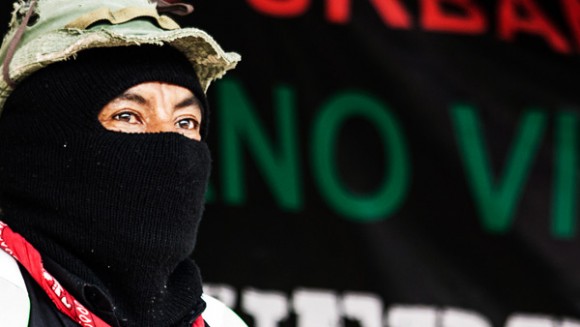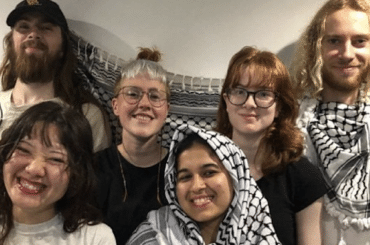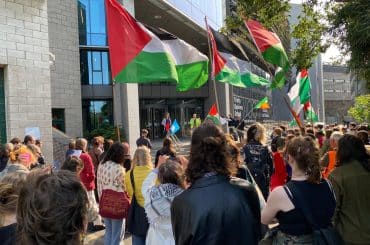The importance of remembering the Palestinian Nakba is not only about historical narrative; but most importantly it is about realizing and understanding the indigeneity of the Palestinian struggle.
On May 15th, 1948, the Palestinian people were ethnically cleansed from the land of historic Palestine that later became the current State of Israel — a State that has and continues to be built at the expense of the Palestinians 67 years later. This process is known to the Palestinians as the Nakba or Catastrophe.
The first occurrence and wave of the Nakba involved the ethnic cleansing process that dispossessed and displaced 750,000 Palestinians into refugee camps in neighboring countries. This includes those that were systematically massacred, as well as those that were internally displaced in refugee camps within what are known today as the 1967 borders of the enclave and reservation territories of the West Bank and Gaza Strip. Furthermore, it also includes those Palestinians that remained in the territories within the 1948 borders, now compromising 20% of Israel’s population living as third class citizens of the State of Israel facing constant threats to their community and collective identity.
The second wave of the Nakba occurred after the 1967 Israeli military and administrative occupation of the reservation territories of the West Bank and Gaza Strip. This continues today through a complex and permanent architecture of violence and matrix of control with the use of settlement expansion, apartheid-type policies, land annexation, usurpation and uprooting as well as overall colonization aimed at pushing and squeezing out the Palestinians from the land through these ethnic cleansing tactics.
The third wave of the Nakba involves the combination of the constant and permanent military adventures of Israel as a settler colonial state combined with laws and policies that administer and facilitate settler colonialism. This has come to be known as bureaucratic ethnic cleansing aimed at using laws and policies to undermine, disempower, oppress and colonize the Palestinians living both within the enclave and reservation territories of the West Bank and Gaza Strip as well as those living inside Israel facing similar laws and policies to those under occupation and colonization. This wave includes the negotations also known as the ‘Peace Process’ as well as the latest ‘recognition’ trend of statehood for the Palestinians as both have been providing more time and distraction tactics for the continued incremental genocide of the Palestinians. They serve as the Nakba in disguise due to their non-binding, inadequate and incompetent nature.
The Indigeneity of the Palestinian Nakba: A Global experience
The historical narrative of the Palestinian struggle for self-determination and the resistance against the past and present Nakba imposed on them through the means mentioned above is familiar and speaks volumes to indigenous peoples across the world.
Indigenous peoples of Canada have and continue to face the same struggles against settler colonialism that facilitated their ethnic cleansing and genocidal experiences that continue today through similar phases, similar forms and similar outcomes. Indigenous peoples inhabited the Canadian lands prior to the creation of the Canadian State which like Israel was and continues to be created at the expense of indigenous peoples of the land. Historically known as turtle island, indigenous peoples have been ethnically cleansed from their lands particularly in the Plains for the facilitation of the settlement expansion and moving in of immigrants to facilitate the two-sector settler colonial economy.The ethnic cleansing processes against indigenous peoples of Canada involved mass rapes and massacres as well, including the placement of indigenous peoples on to enclaves and reservation territories that, like the case of the Palestinians, are given the illusion of self-determination and self-governance. Furthermore, as in the case of the Palestinians, you have those indigenous peoples who are constantly being subjected to displacement and dispossession, those who inhabit reservation areas that are controlled completely by the Canadian State and those that live within the urban settler societies as third-class citizens. Last but not least, the serious human rights violations against indigenous peoples of Canada that have and continue to occur are well documented as in the case of the Palestinians by UN Special Rapporteurs.
The United States has been another settler colonial regime infamous for its genocide of indigenous peoples such as the case of Wounded Knee and the Trail of Tears signifying a Nakba phenomenon as in the case of the Palestinians where the indigenous peoples there were placed on reservation territories with lands seized and colonized along with a mass raping and killing campaign that caused mass deaths and dispossession the effects of which continue to be felt today among indigenous peoples of the United States.
Notwithstanding the aforementioned experiences among these settler colonial regimes the indigenous peoples of Mexico such as the Zapatistas of Chiapas have recognized and felt the similar process that influence and create the similar situational circumstances of dispossession, ethnic cleansing and overall colonization for the facilitation of a neo-liberal settler colonial economy.
The exportation of the Nakba and the role of international law
Given the fact that the indigeneity of the Palestinian struggle against their Nakba has become an internationalized process, this global process of a Nakba against Palestinians and indigenous peoples across the world has now become an exported Israeli product when the relationships of these above mentioned settler colonial states with Israel are further analyzed.
Canada’s staunch unconditional support for Israel has taken a new dimension with the signing of the Canada-Israel Public Security Agreement which includes cooperation on ethnic profiling, crime and punishment, corrections as well as the whole security industrial complex. In addition, the United States continues to be prime financial and military supporter of Israel, whereby Israel is the highest recipient of U.S. foreign aid which includes lethal aid. Last but not least, Mexico has also worked with Israel very closely and in cooperation in relation to security, corrections, and overall death and surveillance technology.
The exportation of the Nakba by Israel is not exclusive to these settler colonial regimes mentioned above but also, to many other countries across the world, particularly the indigenous peoples in various countries of Central and South America. Yet, given this disturbing product being exported by Israel through its death and surveillance technology as well as its overall military capabilities and arms trade profiteering, the international law regime is colluding with its inaction to put an end to this process both locally for the Palestinians as well as globally with indigenous peoples across the world.
Putting an end to the continued Nakba process against the Palestinians and the indigenous peoples across the world begins with the vanguards of international law putting words into action. It starts with the recognition of the Nakba along with respecting the United Nations Declaration on the Rights of Indigenous Peoples including the implementation of the statements made by Secretary General Ban Ki Moon during his attendance at the Special Committee on Decolonization in 2013. This means that the international law regime have to recognize that decolonization to indigenous peoples means the restoration of self-determination which is a concept not exclusive to statehood but rather, it is a human right for indigenous peoples– the right to self-determined and self governed nationhood and collectivity.
It has been 67 years and the Palestinian Nakba continues locally and globally. As Palestinians continue to remember- as the way to resist memoricide- part of the remembrance includes a time for us to be mindful of the words of the late Nelson Mandela where he stated “our freedom is incomplete without the freedom of the Palestinians.” It’s time that indigenous peoples, indigeneity and indigenous rights be truly respected and restored.



Thank you for this important article, Ahmad.
“It has been 67 years and the Palestinian Nakba continues locally and globally. As Palestinians continue to remember- as the way to resist memoricide- part of the remembrance includes a time for us to be mindful of the words of the late Nelson Mandela where he stated “our freedom is incomplete without the freedom of the Palestinians.” It’s time that indigenous peoples, indigeneity and indigenous rights be truly respected and restored.”
It’s past time, Ahmad.
Its is time for the states by the end social inequalities of peripheral peoples human rights University is not an accident is man-made and can be removed